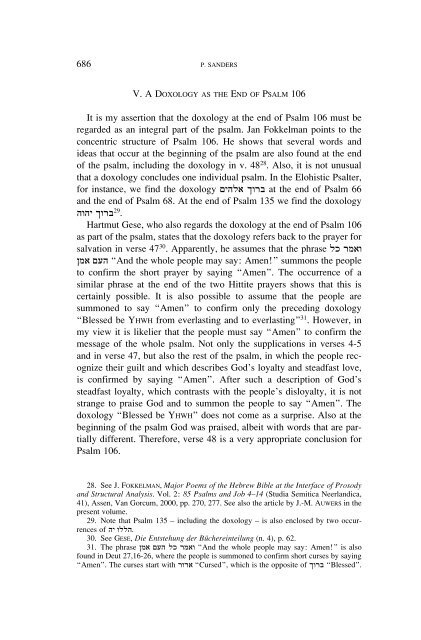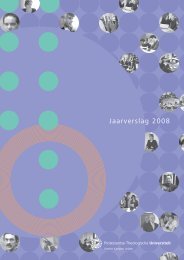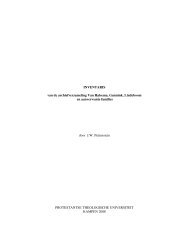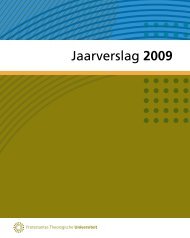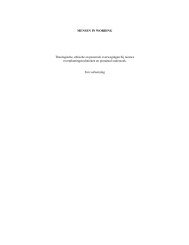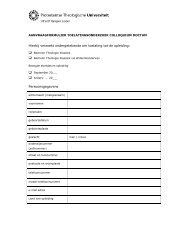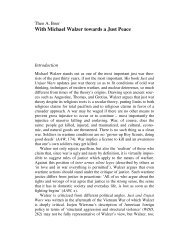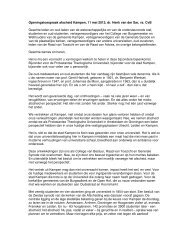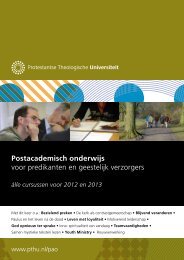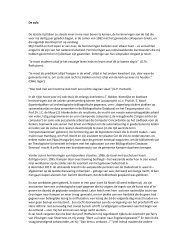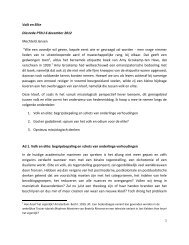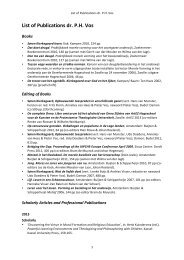the composition of the book of psalms - Protestantse Theologische ...
the composition of the book of psalms - Protestantse Theologische ...
the composition of the book of psalms - Protestantse Theologische ...
You also want an ePaper? Increase the reach of your titles
YUMPU automatically turns print PDFs into web optimized ePapers that Google loves.
686 P. SANDERSV. A DOXOLOGY AS THE END OF PSALM 106It is my assertion that <strong>the</strong> doxology at <strong>the</strong> end <strong>of</strong> Psalm 106 must beregarded as an integral part <strong>of</strong> <strong>the</strong> psalm. Jan Fokkelman points to <strong>the</strong>concentric structure <strong>of</strong> Psalm 106. He shows that several words andideas that occur at <strong>the</strong> beginning <strong>of</strong> <strong>the</strong> psalm are also found at <strong>the</strong> end<strong>of</strong> <strong>the</strong> psalm, including <strong>the</strong> doxology in v. 48 28 . Also, it is not unusualthat a doxology concludes one individual psalm. In <strong>the</strong> Elohistic Psalter,for instance, we find <strong>the</strong> doxology ברוך אלהים at <strong>the</strong> end <strong>of</strong> Psalm 66and <strong>the</strong> end <strong>of</strong> Psalm 68. At <strong>the</strong> end <strong>of</strong> Psalm 135 we find <strong>the</strong> doxology. 29 ברוך יהוהHartmut Gese, who also regards <strong>the</strong> doxology at <strong>the</strong> end <strong>of</strong> Psalm 106as part <strong>of</strong> <strong>the</strong> psalm, states that <strong>the</strong> doxology refers back to <strong>the</strong> prayer forואמר כל salvation in verse 47 30 . Apparently, he assumes that <strong>the</strong> phrase“And <strong>the</strong> whole people may say: Amen!” summons <strong>the</strong> people העם אמןto confirm <strong>the</strong> short prayer by saying “Amen”. The occurrence <strong>of</strong> asimilar phrase at <strong>the</strong> end <strong>of</strong> <strong>the</strong> two Hittite prayers shows that this iscertainly possible. It is also possible to assume that <strong>the</strong> people aresummoned to say “Amen” to confirm only <strong>the</strong> preceding doxology“Blessed be YHWH from everlasting and to everlasting” 31 . However, inmy view it is likelier that <strong>the</strong> people must say “Amen” to confirm <strong>the</strong>message <strong>of</strong> <strong>the</strong> whole psalm. Not only <strong>the</strong> supplications in verses 4-5and in verse 47, but also <strong>the</strong> rest <strong>of</strong> <strong>the</strong> psalm, in which <strong>the</strong> people recognize<strong>the</strong>ir guilt and which describes God’s loyalty and steadfast love,is confirmed by saying “Amen”. After such a description <strong>of</strong> God’ssteadfast loyalty, which contrasts with <strong>the</strong> people’s disloyalty, it is notstrange to praise God and to summon <strong>the</strong> people to say “Amen”. Thedoxology “Blessed be YHWH” does not come as a surprise. Also at <strong>the</strong>beginning <strong>of</strong> <strong>the</strong> psalm God was praised, albeit with words that are partiallydifferent. Therefore, verse 48 is a very appropriate conclusion forPsalm 106.28. See J. FOKKELMAN, Major Poems <strong>of</strong> <strong>the</strong> Hebrew Bible at <strong>the</strong> Interface <strong>of</strong> Prosodyand Structural Analysis. Vol. 2: 85 Psalms and Job 4–14 (Studia Semitica Neerlandica,41), Assen, Van Gorcum, 2000, pp. 270, 277. See also <strong>the</strong> article by J.-M. AUWERS in <strong>the</strong>present volume.29. Note that Psalm 135 – including <strong>the</strong> doxology – is also enclosed by two occur-.הללו יה rences <strong>of</strong>30. See GESE, Die Entstehung der Büchereinteilung (n. 4), p. 62.31. The phrase ואמר כל העם אמן “And <strong>the</strong> whole people may say: Amen!” is als<strong>of</strong>ound in Deut 27,16-26, where <strong>the</strong> people is summoned to confirm short curses by saying“Amen”. The curses start with ארור “Cursed”, which is <strong>the</strong> opposite <strong>of</strong> ברוך “Blessed”.


